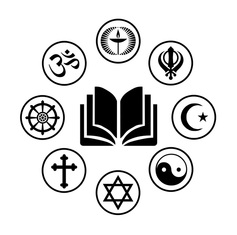
There are many motivations for engaging in dialogue. And while it’s true that it’s people who speak to one another and not religions in the abstract, some people engage in dialogue simply because they’ve been appointed by their community to do so. A wise community would, I think, appoint someone to speak for them at the dialogue table who was interested in it but dialogue today has political implications. So many interfaith groups (at least in this country) at national and local level are financed by governments that have social cohesion as the main aim, want to focus on social justice projects and dialogue about common civic interests and concerns. This is all laudable of course and I’m all for it but it can mean some representatives are intent on getting an equal share of the pie, having their voice heard, defending their position, countering misunderstandings about their faith. Again this is all very laudable and I support it but it often means the impression is one of defensiveness rather than openness to others.
I notice a difference in local interfaith groups that bring together interested individuals from various faith communities who want to learn more about one another and the more formal groups that have set themselves up as charities and operate with a Board of Trustees. I started out on my interfaith journey by getting involved in the Glasgow Sharing of Faiths. I would have said I was a member of this interfaith group even though there was no formal membership. Now we have Interfaith Glasgow with its Board of Trustees and though I go to some of their activities I’m not sure I feel I belong. This is not to say Interfaith Glasgow is not doing a good and important job and that individuals engaged in this more formal way aren’t inspired by the work. The proof of this would be if they were inclined to continue to engage in interfaith once their term of office was finished. But it does change the nature of interfaith groups and raises a question about identity. Who is Interfaith Glasgow – the staff, the Board or the people who participate in their activities? And this question could be asked about interfaith groups up and down the country.
It’s good that faith communities are working with one another, that they have come out of their past isolation and are intent on playing their part in civic life. There’s a danger, however, that named representatives are seen as the ones to do the interfaith work which lets others off the hook. There’s as much work for an interfaith representative to do within the community as without. And that work I think is in the area of education. Hans Kung has said it’s important to investigate the foundation of the religions – and not just their beliefs and practices - if there is to be real dialogue. At heart nearly all the world faiths began as renewal movements within existing religions. Religious founders called people back to a way of life which put aside greed and violence, put God and the transcendent first and showed the secret of human flourishing was compassion, justice and love of neighbour. The ideals of religions are to be found in their origins though often the context into which the religion was born determined how these were expressed. And a study of these foundations helps us realise the way in which the religion has developed and rethought its faith in the light of new historical and cultural contexts, sometimes deviating from the ideal of its founder. This, I think, helps us realise the good and bad in all religions and to a certain extent not to judge. A principle of interfaith relations is always to compare like with like and to avoid comparing the ideals of our own with the perceived reality of the other, which of course never quite comes up to the ideals of our own. It helps us develop the respect and sympathy necessary for positive and fruitful dialogue. It helps us appreciate the good in religion (our own as well as others) and the short comings that let all our religions down.
Yes, I do think Hans Kung is right. Study and learning about other religions is necessary and a good way to begin the interfaith journey.


 RSS Feed
RSS Feed
